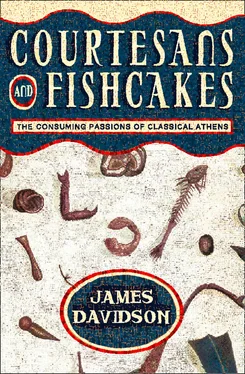On the one hand so unremarkable and unremarked a feature of daily life that it could almost have escaped the notice of posterity, this distinction seems a classic case of a habit which inscribes ideology into practice. A particular set of beliefs about the world can become more rather than less powerful through being unspoken, aspiring to the rank of habit rather than ideology, and a status beyond language, questioning and argument in the cultural unconscious. In place of articulation, value and meaning can be assigned by means of carefully modulated differences between symbolically charged zones and directions. In a city like Athens, contrasted spaces, such as the women’s quarters and the men’s room, or private interiors and public streets, were symbolically charged. In the case of food, value could be read into the orientations of personal geography: left and right, bottom and top, staple and opson . 24 Конец ознакомительного фрагмента. Текст предоставлен ООО «ЛитРес». Прочитайте эту книгу целиком, купив полную легальную версию на ЛитРес. Безопасно оплатить книгу можно банковской картой Visa, MasterCard, Maestro, со счета мобильного телефона, с платежного терминала, в салоне МТС или Связной, через PayPal, WebMoney, Яндекс.Деньги, QIWI Кошелек, бонусными картами или другим удобным Вам способом.
Opson is not a material object, and not really an idea. It is, above all, a space.
This space turns out to be somewhat ambivalent. It has a well-established position in the diet and yet seems somehow superfluous, merely decorative. In this it bears more than a passing resemblance to what Derrida identified as a persistent source of anxiety in Western philosophy, an addition which seems to complete something and yet to be extraneous, threatening all the time to forget its negligible subordinate role and take over what it is supposed merely to complete or embellish. Following Rousseau, he labelled this ambiguous addition the ‘dangerous supplement’, a phrase that seems to describe opson , the dietary supplement, rather accurately. Numerous passages seem to treat opson as an essential; it is what the right hand reaches out for to complement the bread in the left; it is one of the three pillars of existence, listed in numerous ancient writings on diet. It crops up in accounts of daily expenditure along with other essentials such as barley and wood. It is a prerequisite of allowances and salaries. 25 Конец ознакомительного фрагмента. Текст предоставлен ООО «ЛитРес». Прочитайте эту книгу целиком, купив полную легальную версию на ЛитРес. Безопасно оплатить книгу можно банковской картой Visa, MasterCard, Maestro, со счета мобильного телефона, с платежного терминала, в салоне МТС или Связной, через PayPal, WebMoney, Яндекс.Деньги, QIWI Кошелек, бонусными картами или другим удобным Вам способом.
On the other hand it can be considered a mere dietary accessory, whose only purpose is to make the real sustaining part of diet, the staple, more palatable. This treatment of opson as the merest garnish is also found early on in the annals of Greek literature, in a passage well known to the Socratic circle and cited by both Plato and Xenophon: a scene from Iliad 11.630 in which the poet describes Nestor’s servant preparing a drink in a magnificent cup of heroic proportions to which is added a piece of onion as opson . The habitual differentiation at meal-times of left and right, bottom and top is easily translated into more ideological contrasts: substance and decoration, necessity and excess, truth and façade.
The other two elements of diet could be fixed and controlled without difficulty. Bread could be substituted for sitos , and water or wine for potos , but there was no such simple solution to the space of opson , which remained intrinsically awkward to pin down, a space for dietary variety. Philosophers in particular were deeply suspicious about a part of sustenance which represented an opportunity for innovation and extravagance, as Plato makes clear in a section of dialogue from the Republic . Socrates is fantasizing about early society in a pristine state of nature: ‘They will produce sitos and wine and clothes and shoes. They will live off barley-meal or wheat-meal, laid out on rushes or fresh leaves and they will feast magnificently with their children around them, recumbent on couches of myrtle and bryony, drinking wine, festooned with garlands and singing hymns to the gods, in enjoyment of each others’ company.’ After this little excursus on an ancient idyll, Glaucon interrupts, to point out the obvious omission: ‘You’re making these people dine without opson .’ ‘You’re quite right’, says Socrates disingenuously, ‘I forgot that they will have opson too,’ going on to list the most desultory things he can think of: salt, oil and cheese and whatever vegetable matter can be gathered from the fields: acorns, for example. Glaucon is outraged and adds the rather sinister comment that Socrates has been talking as if he were fattening up a city of pigs. He demands ‘What is normal’, including ‘ opsa that modern men have’. Socrates counters that Glaucon, in that case, is talking not simply of a city, but of a luxurious city, a city with couches and tables and all the other articles of furniture, he continues contemptuously, ‘ opsa , of course, as well as perfumes, aromatic fumigations, hetaeras and cakes, in all their various varieties’. 26 Конец ознакомительного фрагмента. Текст предоставлен ООО «ЛитРес». Прочитайте эту книгу целиком, купив полную легальную версию на ЛитРес. Безопасно оплатить книгу можно банковской картой Visa, MasterCard, Maestro, со счета мобильного телефона, с платежного терминала, в салоне МТС или Связной, через PayPal, WebMoney, Яндекс.Деньги, QIWI Кошелек, бонусными картами или другим удобным Вам способом.
Plato was a famously careful writer. After his death a tablet was found among his possessions with the first eight words of the Republic written out in different arrangements. Socrates’ carelessness here is extremely well calculated and it illustrates perfectly the problem with opson. It already has a well-established position in the traditions of Greek diet and cannot ultimately be dislodged, but this omission puts it firmly in its negligible place. It is something to be ignored, elided or forgotten, something of no importance. When forced to address the oversight, Socrates tries to fix opson in a state of nature; he fills the dietary space with the most perfunctory edibles, whatever is ready to hand, requiring the bare minimum of preparation. Opson receives a similar kind of limitation, a progressive annihilation, even, in Xenophon’s Cyropedia , an idealistic and ascetic vision of the ancestral Persians. In the old system of education, we are told, boys up to sixteen or seventeen lived off bread as sitos , water from a river to supply them with liquid, and cardamon (a type of cress) as opson . The slightly older boys, whom Xenophon calls the ephebes, went hunting with one day’s ration of bread, and nothing at all in the way of opson but what they managed to catch in the field. Opson has at this point become no more than an opportunity. According to Xenophon, however, Socrates went even further and ate just sufficient food ‘so that desire for sitos was its opson ’, appetite the best sauce. 27 Конец ознакомительного фрагмента. Текст предоставлен ООО «ЛитРес». Прочитайте эту книгу целиком, купив полную легальную версию на ЛитРес. Безопасно оплатить книгу можно банковской картой Visa, MasterCard, Maestro, со счета мобильного телефона, с платежного терминала, в салоне МТС или Связной, через PayPal, WebMoney, Яндекс.Деньги, QIWI Кошелек, бонусными картами или другим удобным Вам способом.
Читать дальше












